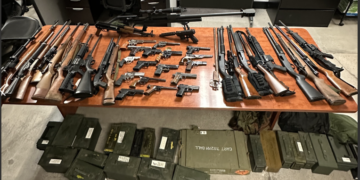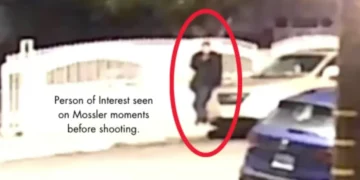LOS ANGELES, CA – One of two men sentenced to death for a notorious 1980 massacre at a Bob’s Big Boy restaurant in Los Angeles is seeking a reduction in his sentence that could make him eligible for parole.
Ricardo Rene Sanders, 79, convicted for his role in the armed robbery that left four people dead, has initiated legal proceedings for resentencing under recent California laws allowing judges to reconsider sentences in certain cases. The development raises the possibility that Sanders, once condemned to die, could see his sentence reduced to life with parole.
The Los Angeles County District Attorney’s Office stated it would oppose the request. “We are objecting to the defense request to resentence to life with the possibility of parole,” the office said in an email on Wednesday.
If granted, a reduction to life with parole would make Sanders eligible for an immediate parole hearing due to his advanced age.
The 1980 Freezer Murders
The brutal killings occurred on Dec. 14, 1980, at a now-closed Bob’s Big Boy location on La Cienega Boulevard. Around 2:00 a.m., two armed men stormed the restaurant, ordering employees and customers into a walk-in freezer. After robbing them of cash, jewelry, and personal items, the attackers ordered the victims to face the wall and kneel.
The gunmen then opened fire, shooting until they ran out of ammunition before shutting the freezer door and fleeing with $1,300 from the restaurant safe.
The massacre left three people dead at the scene: David Burrell, Dita Agtani, and Ahmad Mushuk. A fourth victim, employee Cesario Luna, died months later from a gunshot wound to his brain. Five others survived, some with life-altering injuries, while two were unharmed.
Arrests and Convictions
Sanders, Franklin Freeman Jr., and Carletha Stewart were arrested a week after the killings. Survivors and witnesses identified the suspects, a point Sanders unsuccessfully challenged in multiple appeals.
Sanders was convicted of four counts of murder with special circumstances and sentenced to death. Freeman received life in prison without parole, while Stewart, who helped plan the robbery, pleaded guilty to murder charges and was sentenced to life imprisonment.
Sanders’ pursuit of resentencing comes amid changing California sentencing laws that permit reconsideration of long-standing prison terms. Harvey Giss, the retired prosecutor who handled Sanders’ case, expressed disbelief at the possibility of a reduced sentence.
“I can’t believe that the legislature ever intended a result like this,” Giss said.
The details behind Sanders’ request remain sparse, with limited filings visible in public court records. Sanders’ federal public defender has not commented publicly on the case.
The prospect of resentencing has drawn concern from survivors and family members of the victims, who have lived with the trauma of the crime for decades. The attack was one of the most shocking crimes in Los Angeles at the time, leaving deep scars on survivors and their loved ones.
Sanders’ resentencing hearing, initially scheduled for Friday at the Clara Shortridge Foltz Criminal Justice Center, was postponed and is now set for Jan. 22, 2025. If his sentence is reduced, it could open the door to a parole hearing, potentially marking a dramatic shift in the decades-long case.


























